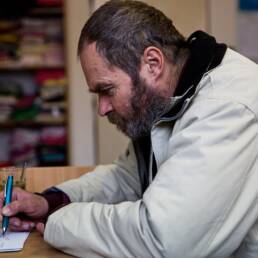Author
Martina Veverkova
Social Analyst
Caritas Czech Republic
Before I started my job at Caritas Czech Republic, I once saw a documentary simply entitled “Exekuce”, meaning “Enforcement”).
This film was about the terrible practices of private bailiffs, including clientelist relationships with some creditors, and its devastating consequences on people who had lost everything due to these practices. It stated that 1 out of 10 Czechs was under an enforcement procedure. Back then, it was hard for me to believe that something like that was really happening in a country like the Czech Republic.
Caritas beneficiaries in debt traps
Now, working at Caritas, I observe this problem from a much closer perspective. Debts and enforcements are widespread among the beneficiaries of our social prevention and counselling services – 65 % of them are indebted[1], of which three quarters are currently not able to repay their debts. But the debts concern, to a lesser extent, also beneficiaries of our social care services – the elderly and handicapped people. There is also another vulnerable group concerned – several thousand children and minors are indebted, often for the reasons that they did not caused.[2]
To give the complete figures, according to the Baillif’s Chamber 820,000 people were under the Enforcement procedures in the Czech Republic in 2018, which is slightly less than the year before. This represents 7.8 % of the population. Needless to say that also the families, friends and employers of those under enforcement procedures are negatively affected.
As Caritas we are not only observing the situation, but helping by providing debt counselling in 46 of our 69 counselling centres. There, we helped some 8,600 debtors last year[3]. In 2018, Caritas staff prepared insolvency petitions for 914 beneficiaries, but identified some 2,200 more in need of a personal bankruptcy procedure that was not accessible to them due to the lack of a legal framework. Without a change in the legislation they will remain in a debt trap forever.
Over-indebted people usually face multiple enforcement procedures led by different bailiffs. Due to the sum of all the fees, interests and sanctions, the debts are growing faster than the debtor could possibly repay them. The debtor’s bank account is usually blocked by one of the bailiffs, which also means that new debts can occur just because regular payments couldn´t be proceeded. The principal problem is that the unenforceable amount (what the debtor can keep for his needs) is not enough to cover living expenses because it is as the meagre amount equivalent to two thirds of the minimum income benefits.
Caritas’ advocacy for a solution
In last few years, the enforcements and over-indebtedness have become a hot topic of political and public discussion. According to recently published survey, 30 % of people consider it an important topic for the Czech Republic, but when it comes to those who have personal experience with the enforcement procedure, the proportion goes up to 62 % – it shows that the more aware people are, the more they see it as a serious problem. In comparison to 2015, nowadays people consider it as an even more relevant topic for the political programmes (79% in 2019 vs. 64% in 2015)[4].
Some things have already changed during this period: the bailiffs´ and lawyers´ commissions were lowered, there is a new regulation for consumer loans, and debt counselling is now regulated (which puts an obstacle to those who tried to profit from difficult situations of the debtors).
As Caritas identified that many of our beneficiaries (and other debtors as well) cannot access the debt relief procedures because they are not able to repay 30 % of their debts within 5 years, we were emphasizing the importance of changing the Insolvency Law and lower this threshold.
Liberating people from their debts has become a very controversial topic in our society and the discussions were long and difficult, but the amendment finally passed through at the beginning of 2019 and came into force in June.
Caritas was advocating, together with other NGOs, for a more transparent version of the law, proposed by the Senate. At the end, this proposal was not accepted and the version that is now in force includes unclear conditions for those who will repay less than 30% of the debts within 5 years – the court will decide at the end, if the debtor made every effort to repay the maximum he could, and if it not, he will not be liberated from the debts. The main problem with this is that it is very hard to define what “every effort” is. On the other hand, there are more favourable conditions for elderly and handicapped people – they will be liberated from debts after 3 years of repayment. Nevertheless, the system remains much more restrictive than in other European countries.
Ready for the next round: territoriality of the bailiffs
Despite the recent changes, one big challenge remains: amendment to the Enforcement Law, that would make the system cheaper and more efficient, and would prevent people from falling in to debt traps.
The Ministry of Justice recently prepared a proposal that includes “concentration of the procedures”, which means that one debtor would have only one bailiff collecting his debts. But this would not change the fact that the “first creditor” can choose the bailiff – this means, in fact, that the bailiffs are dependent on creditors, which is one of the primary causes why the system is now so problematic. The solution could be so-called “territoriality” – which means that the bailiff would be selected randomly by the court according to permanent residence of the debtor, and each other case will be proceeded to the same one. As part of the creditors and bailiffs are against this measure it will not be easy to push through this idea. We expect to know more about this in the autumn.
If this was achieved, we would finally be able to say that for the future, Czech people will be better protected from injustice and excessive indebtedness. But even then, many years will pass before the problem is solved for the hundreds of thousands of people who are concerned now, because there is no possibility or will to revoke the injustices from the past.
About the author
Martina Veverková works as a Social Analyst at Caritas Czech Republic. As a sociologist, she is interested in equality between men and women, labour market conditions and poverty and social exclusion. She is co-author of the CARES Report 2017, the study “Let´s prevent debt traps!” and the study on the Czech system of minimum income (in collaboration with the European Anti-poverty Network, EMIN2 project).
Notes:
[1] Based on Caritas Poverty Observatories Light questionnaire survey, february 2019
[2] Caritas Cares Youth Poverty Czech Republic report
[3] Statistics in this paragraph are based on data collected directly from Caritas social services for the purposes of Annual Report 2018
[4] NMS market research for Czech Pirate party, Enforcements – final report from the survey, March 2019












